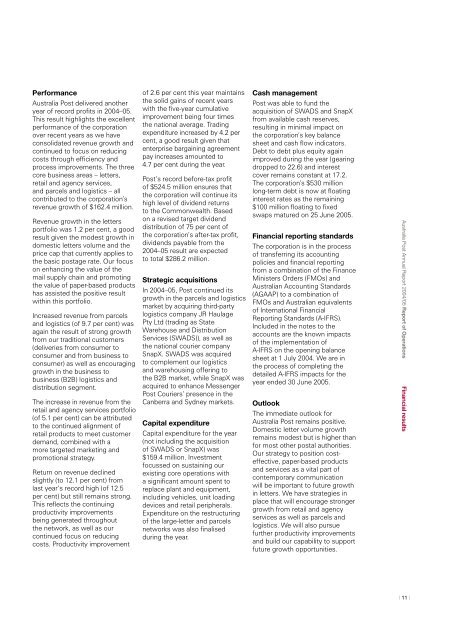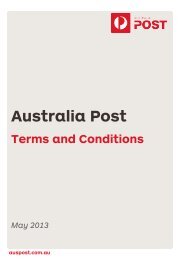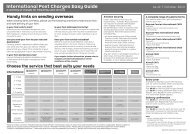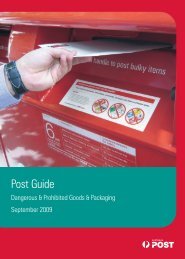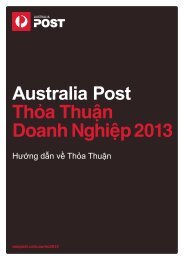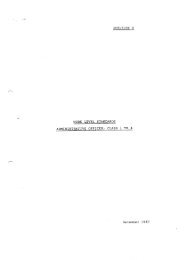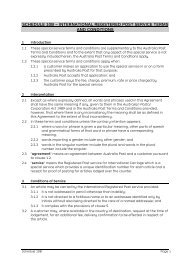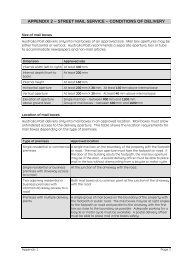2004-05 Annual Report - Australia Post
2004-05 Annual Report - Australia Post
2004-05 Annual Report - Australia Post
Create successful ePaper yourself
Turn your PDF publications into a flip-book with our unique Google optimized e-Paper software.
Performance<br />
<strong>Australia</strong> <strong>Post</strong> delivered another<br />
year of record profits in <strong>2004</strong>–<strong>05</strong>.<br />
This result highlights the excellent<br />
performance of the corporation<br />
over recent years as we have<br />
consolidated revenue growth and<br />
continued to focus on reducing<br />
costs through efficiency and<br />
process improvements. The three<br />
core business areas – letters,<br />
retail and agency services,<br />
and parcels and logistics – all<br />
contributed to the corporation’s<br />
revenue growth of $162.4 million.<br />
Revenue growth in the letters<br />
portfolio was 1.2 per cent, a good<br />
result given the modest growth in<br />
domestic letters volume and the<br />
price cap that currently applies to<br />
the basic postage rate. Our focus<br />
on enhancing the value of the<br />
mail supply chain and promoting<br />
the value of paper-based products<br />
has assisted the positive result<br />
within this portfolio.<br />
Increased revenue from parcels<br />
and logistics (of 9.7 per cent) was<br />
again the result of strong growth<br />
from our traditional customers<br />
(deliveries from consumer to<br />
consumer and from business to<br />
consumer) as well as encouraging<br />
growth in the business to<br />
business (B2B) logistics and<br />
distribution segment.<br />
The increase in revenue from the<br />
retail and agency services portfolio<br />
(of 5.1 per cent) can be attributed<br />
to the continued alignment of<br />
retail products to meet customer<br />
demand, combined with a<br />
more targeted marketing and<br />
promotional strategy.<br />
Return on revenue declined<br />
slightly (to 12.1 per cent) from<br />
last year’s record high (of 12.5<br />
per cent) but still remains strong.<br />
This reflects the continuing<br />
productivity improvements<br />
being generated throughout<br />
the network, as well as our<br />
continued focus on reducing<br />
costs. Productivity improvement<br />
of 2.6 per cent this year maintains<br />
the solid gains of recent years<br />
with the five-year cumulative<br />
improvement being four times<br />
the national average. Trading<br />
expenditure increased by 4.2 per<br />
cent, a good result given that<br />
enterprise bargaining agreement<br />
pay increases amounted to<br />
4.7 per cent during the year.<br />
<strong>Post</strong>’s record before-tax profit<br />
of $524.5 million ensures that<br />
the corporation will continue its<br />
high level of dividend returns<br />
to the Commonwealth. Based<br />
on a revised target dividend<br />
distribution of 75 per cent of<br />
the corporation’s after-tax profit,<br />
dividends payable from the<br />
<strong>2004</strong>–<strong>05</strong> result are expected<br />
to total $286.2 million.<br />
Strategic acquisitions<br />
In <strong>2004</strong>–<strong>05</strong>, <strong>Post</strong> continued its<br />
growth in the parcels and logistics<br />
market by acquiring third-party<br />
logistics company JR Haulage<br />
Pty Ltd (trading as State<br />
Warehouse and Distribution<br />
Services (SWADS)), as well as<br />
the national courier company<br />
SnapX. SWADS was acquired<br />
to complement our logistics<br />
and warehousing offering to<br />
the B2B market, while SnapX was<br />
acquired to enhance Messenger<br />
<strong>Post</strong> Couriers’ presence in the<br />
Canberra and Sydney markets.<br />
Capital expenditure<br />
Capital expenditure for the year<br />
(not including the acquisition<br />
of SWADS or SnapX) was<br />
$159.4 million. Investment<br />
focussed on sustaining our<br />
existing core operations with<br />
a significant amount spent to<br />
replace plant and equipment,<br />
including vehicles, unit loading<br />
devices and retail peripherals.<br />
Expenditure on the restructuring<br />
of the large-letter and parcels<br />
networks was also finalised<br />
during the year.<br />
Cash management<br />
<strong>Post</strong> was able to fund the<br />
acquisition of SWADS and SnapX<br />
from available cash reserves,<br />
resulting in minimal impact on<br />
the corporation’s key balance<br />
sheet and cash flow indicators.<br />
Debt to debt plus equity again<br />
improved during the year (gearing<br />
dropped to 22.6) and interest<br />
cover remains constant at 17.2.<br />
The corporation’s $530 million<br />
long-term debt is now at floating<br />
interest rates as the remaining<br />
$100 million floating to fixed<br />
swaps matured on 25 June 20<strong>05</strong>.<br />
Financial reporting standards<br />
The corporation is in the process<br />
of transferring its accounting<br />
policies and financial reporting<br />
from a combination of the Finance<br />
Ministers Orders (FMOs) and<br />
<strong>Australia</strong>n Accounting Standards<br />
(AGAAP) to a combination of<br />
FMOs and <strong>Australia</strong>n equivalents<br />
of International Financial<br />
<strong>Report</strong>ing Standards (A-IFRS).<br />
Included in the notes to the<br />
accounts are the known impacts<br />
of the implementation of<br />
A-IFRS on the opening balance<br />
sheet at 1 July <strong>2004</strong>. We are in<br />
the process of completing the<br />
detailed A-IFRS impacts for the<br />
year ended 30 June 20<strong>05</strong>.<br />
Outlook<br />
The immediate outlook for<br />
<strong>Australia</strong> <strong>Post</strong> remains positive.<br />
Domestic letter volume growth<br />
remains modest but is higher than<br />
for most other postal authorities.<br />
Our strategy to position costeffective,<br />
paper-based products<br />
and services as a vital part of<br />
contemporary communication<br />
will be important to future growth<br />
in letters. We have strategies in<br />
place that will encourage stronger<br />
growth from retail and agency<br />
services as well as parcels and<br />
logistics. We will also pursue<br />
further productivity improvements<br />
and build our capability to support<br />
future growth opportunities.<br />
<strong>Australia</strong> <strong>Post</strong> <strong>Annual</strong> <strong>Report</strong> <strong>2004</strong>/<strong>05</strong> <strong>Report</strong> of Operations<br />
Financial results<br />
| 11 |


